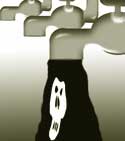SOUTH KOREA
 A controversy has erupted over recent research revealing that more than 35 per cent of Seoul's water could be contaminated. Even as officials in the South Korean capital initially refuted the findings, they have outlined an action plan to regularly monitor the city's tap water. This will include inspection of faucets in all buildings in downtown Seoul with each tap being tagged to ascertain the source of contamination. This year, 6,600 different areas will be under scrutiny and the number is expected to rise to one million by 2006. Also on the cards is tightening of norms on handling water pipelines and tanks.
A controversy has erupted over recent research revealing that more than 35 per cent of Seoul's water could be contaminated. Even as officials in the South Korean capital initially refuted the findings, they have outlined an action plan to regularly monitor the city's tap water. This will include inspection of faucets in all buildings in downtown Seoul with each tap being tagged to ascertain the source of contamination. This year, 6,600 different areas will be under scrutiny and the number is expected to rise to one million by 2006. Also on the cards is tightening of norms on handling water pipelines and tanks.
Related Content
- Global LNG outlook 2024-2028
- Accelerating the implementation of India's national green hydrogen mission: assessment of standards to enable the ecosystem
- Ramping up energy storage: lessons for the EU
- Climate vulnerability of East Asia: adaptation in the region can provide global benefits
- Blockchain and IoT for drinking water in G20 countries: a game-changing opportunity
- Creative India: tapping the full potential
